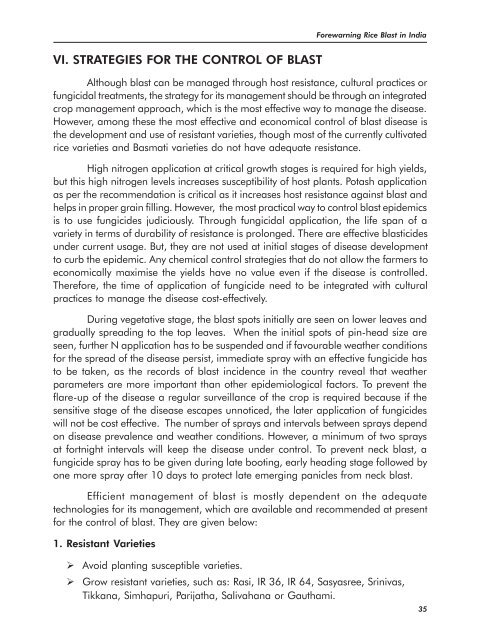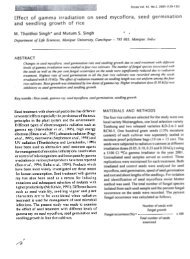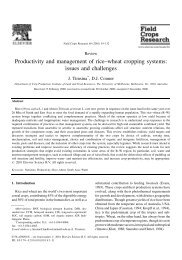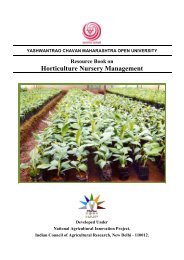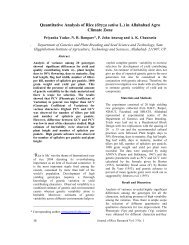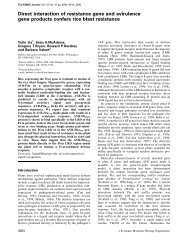Forewarning Rice Blast in India
Forewarning Rice Blast in India
Forewarning Rice Blast in India
You also want an ePaper? Increase the reach of your titles
YUMPU automatically turns print PDFs into web optimized ePapers that Google loves.
VI. STRATEGIES FOR THE CONTROL OF BLAST<br />
Although blast can be managed through host resistance, cultural practices or<br />
fungicidal treatments, the strategy for its management should be through an <strong>in</strong>tegrated<br />
crop management approach, which is the most effective way to manage the disease.<br />
However, among these the most effective and economical control of blast disease is<br />
the development and use of resistant varieties, though most of the currently cultivated<br />
rice varieties and Basmati varieties do not have adequate resistance.<br />
High nitrogen application at critical growth stages is required for high yields,<br />
but this high nitrogen levels <strong>in</strong>creases susceptibility of host plants. Potash application<br />
as per the recommendation is critical as it <strong>in</strong>creases host resistance aga<strong>in</strong>st blast and<br />
helps <strong>in</strong> proper gra<strong>in</strong> fill<strong>in</strong>g. However, the most practical way to control blast epidemics<br />
is to use fungicides judiciously. Through fungicidal application, the life span of a<br />
variety <strong>in</strong> terms of durability of resistance is prolonged. There are effective blasticides<br />
under current usage. But, they are not used at <strong>in</strong>itial stages of disease development<br />
to curb the epidemic. Any chemical control strategies that do not allow the farmers to<br />
economically maximise the yields have no value even if the disease is controlled.<br />
Therefore, the time of application of fungicide need to be <strong>in</strong>tegrated with cultural<br />
practices to manage the disease cost-effectively.<br />
Dur<strong>in</strong>g vegetative stage, the blast spots <strong>in</strong>itially are seen on lower leaves and<br />
gradually spread<strong>in</strong>g to the top leaves. When the <strong>in</strong>itial spots of p<strong>in</strong>-head size are<br />
seen, further N application has to be suspended and if favourable weather conditions<br />
for the spread of the disease persist, immediate spray with an effective fungicide has<br />
to be taken, as the records of blast <strong>in</strong>cidence <strong>in</strong> the country reveal that weather<br />
parameters are more important than other epidemiological factors. To prevent the<br />
flare-up of the disease a regular surveillance of the crop is required because if the<br />
sensitive stage of the disease escapes unnoticed, the later application of fungicides<br />
will not be cost effective. The number of sprays and <strong>in</strong>tervals between sprays depend<br />
on disease prevalence and weather conditions. However, a m<strong>in</strong>imum of two sprays<br />
at fortnight <strong>in</strong>tervals will keep the disease under control. To prevent neck blast, a<br />
fungicide spray has to be given dur<strong>in</strong>g late boot<strong>in</strong>g, early head<strong>in</strong>g stage followed by<br />
one more spray after 10 days to protect late emerg<strong>in</strong>g panicles from neck blast.<br />
Efficient management of blast is mostly dependent on the adequate<br />
technologies for its management, which are available and recommended at present<br />
for the control of blast. They are given below:<br />
1. Resistant Varieties<br />
<strong>Forewarn<strong>in</strong>g</strong> <strong>Rice</strong> <strong>Blast</strong> <strong>in</strong> <strong>India</strong><br />
Ø Avoid plant<strong>in</strong>g susceptible varieties.<br />
Ø Grow resistant varieties, such as: Rasi, IR 36, IR 64, Sasyasree, Sr<strong>in</strong>ivas,<br />
Tikkana, Simhapuri, Parijatha, Salivahana or Gauthami.<br />
35


